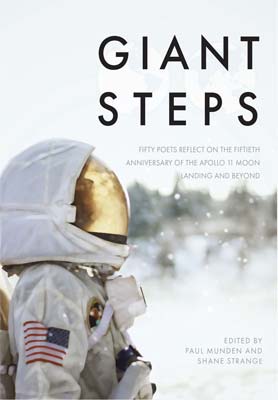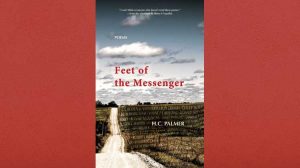Giant Steps: Fifty poets reflect on the Apollo 11 moon landing and beyond, edited by Paul Munden and Shane Strange /Recent Works Press / Canberra, Australia / 2019 / 101 pages / 9780648553717
 In 1969 when Apollo 11 landed, I was twelve years old. I watched, rapt, as the screen of our Zenith color TV went gray and fuzzy and I heard the staticky voices of the astronauts. Back then, I had no idea that the whole world was watching too. I am still surprised to come upon an anthology celebrating the 50th anniversary of the Apollo 11 landing that hails from Australia and culls work from highly accomplished international poets. In this collection, you’ll find work from such far-flung writers as the prize-winning Slovakian poet, James Southerland Smith, the Scottish Trinidadian poet Vahni Cupildeo, and Alvin Pang, the poet and editor from Singapore.
In 1969 when Apollo 11 landed, I was twelve years old. I watched, rapt, as the screen of our Zenith color TV went gray and fuzzy and I heard the staticky voices of the astronauts. Back then, I had no idea that the whole world was watching too. I am still surprised to come upon an anthology celebrating the 50th anniversary of the Apollo 11 landing that hails from Australia and culls work from highly accomplished international poets. In this collection, you’ll find work from such far-flung writers as the prize-winning Slovakian poet, James Southerland Smith, the Scottish Trinidadian poet Vahni Cupildeo, and Alvin Pang, the poet and editor from Singapore.
Each poet was asked to write a poem in celebration of Apollo 11’s successful mission, and another to develop the concept of space and perspective. Having been a tween when the landing occurred, I was particularly enamored by the Japanese poet, Keuiro Suga’s “What We Didn’t Know.” It begins with eleven-year-old girlfriends in a noodle shop on the last day of school hearing the TV announcer “rambling on” about the moon landing. Against this backdrop, the girls excitedly look forward to a summer of beetle hunting and swimming in the school’s dirty pool. In “Walking on Green Cheese,” Ross Donlon reminds us of a 1958 Tom and Jerry cartoon of a moon landing in which Jerry Mouse proved the moon wasn’t made of green cheese. He broke a tooth by biting into it.
The idea of “first steps” led Eileen Chong to write in “Season 1” about a one-year-old taking first steps to applause, the event becoming as famous with grandparents as the astronauts to the world. In “Blessed Among Lunacies,” Anne Casey paints three scenes. In the first, she’s watching the moon landing on TV in her homeland, Ireland, with her brother whose face is round and bright as the moon. In the second, moonlight saves her from drowning during a night swim in Indonesia. The third is the birth of her first son in a hospital in her new country, Australia. “his alien face looming.” In “Jaundice,” English poet Helen Mort, describes her son in an incubator as “a grounded astronaut / blue-lit, a tiny visor covering his eyes.”
“We came in peace for all mankind” was the motto of the landing. But in “Oops,” Oliver Comins writes, “Or do the hunters have their day to come, / armed and dangerous with space-age equivalents / of guns and blades?” Interspersing “22 November 2018” with biblical quotes, Melinda Smith hints that the moon landing was an invasion by recounting the murder of missionary, John Allen Chau, by a remote Sentinelese tribe. Geoff Page, in Buzz 1, decries the Christianization of the mission. Buzz Aldrin recanted “the first meal ever on the moon / was made from bread and wine, / regretting just a little that / the sacrament had been / a Christian one alone.”
There’s always something new to learn about the Apollo 11 moonwalk and landing. In “Space Couture,” Atherton lets us know that the spacesuit was “made from Teflon-coated silica-fiber cloth and a woven form of stainless steel. Tailored by seamstresses from a bra and girdle assembly line in Frederica, Delaware…” In “Astronaut Ice Cream,” Atherton lets us know something we were all holding our breath to learn—“the astronauts left 93 bags of poo, poop, and puke on the moon…”
Not only is there a lot to learn about the Apollo 11 moon landing as seen through the eyes of these poets, but about poetics as well. “Afterworld,” Alex Skovron’s poem about the yearning of the soul consigned to the “dust of our sleeping,” uses end rhymes complex enough to satisfy the ear without sounding singsong. Moira Egan, in “Ghazal: Moon,” shakes up the reader with each repetition. “a barren woman contemplates the moon.” “A lake of wavy onyx, the mirrored moon.” Phillip Gross’ ode, a song of praise, “Moon, O,” is a delight of the un-ode-like descriptions. “O, bleachy- / skinned cool mistress, arsenic complexion, dead- / pan geisha unmoved by our high romance.” Lisa Brockwell’s “O(R)BIT” is a haunting poem created by erasing lines from the divorced wife of Neil Armstrong, Jane Shearon.
There are so many examples of wit and imagination in Giant Steps, but I’ll end with Alison Hawthorne Deming’s final lines in “Dear Moon”:
Dear Moon,
science says you are drifting farther away from us
but I promise you that art will never let you go.




Leave a Reply